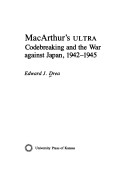Cracking the enemy's radio code is a task so urgent and so difficult that it demands the military's best minds and most sophisticated technology. But when the coded messages are in a language as complex as Japanese, decoding problems multiply dramatically. It took the US Army a full two years after the attack on Pearl Harbour to break the codes of the Japanese Imperial Army. But by 1944 the US was decoding more than 20,000 messages a month filled with information about enemy movements, strategy, fortifications, troop strengths, and supply convoys. In "MacArthur's ULTRA", historian Edward Drea recounts the story behind the Army's painstaking decryption operation and its dramatic breakthrough. He demonstrates how ULTRA (intelligence from decrypted Japanese radio communications) shaped MacArthur's operations in New Guinea and the Philippines and its effect on the outcome of World War II. From sources on both sides of the Pacific and national security agency declassified records, Drea has compiled a detailed listing of the ULTRA intelligence available to MacArthur.
By correlating the existing intelligence with MacArthur's operational decisions, Drea shows ow MacArthur used - and misused - intelligence information. He tells for the first time the story behind Macarthur's bold leap to Hollandia in 1944 and shows how ULTRA revealed the massive Japanese mobilization for what might have been (had it occurred) the bloodiest and most protracted engagement of the entire war - the Allied invasion of Japan. Drea also clarifies the role of ULTRA in Truman's decision to drop atomic bombs on Japan in 1945 and concludes that ULTRA shortened the war by six to ten months.
- ISBN10 0700605045
- ISBN13 9780700605040
- Publish Date February 1992 (first published 20 December 1991)
- Publish Status Out of Print
- Out of Print 18 October 2003
- Publish Country US
- Imprint University Press of Kansas
- Format Hardcover
- Pages 304
- Language English
